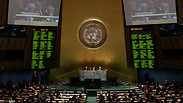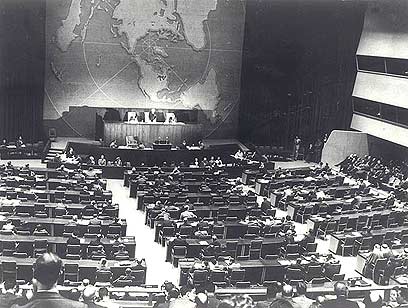
Opposing events mark day of historic UN vote on Israel
Friday is 66-year anniversary of UN vote on British Mandate. In Beersheba: Second annual day of commemoration for injured IDF soldiers. Tel Aviv: 'Right of return' Nakba film festival
Sixty-six years ago, on November 29, 1947 at 12:40 am, the UN took the vote that led to Israel's creation. Last year, this emblematic day was marked, ironically, when the UN General Assembly overwhelmingly voted to upgrade the Palestinian's diplomatic status to that of a 'non-member observer state.'
This year, the day was marked in Israel in two diametric events. While teenage activists in Beersheba united to channel the symbolism into a commemoration for injured IDF soldiers, in Tel Aviv a group seeking to raise awareness about the Nakba organized a three-day film festival at the Cinematheque.
Related stories:
- First Israeli Film Festival on Palestinian 'Nakba'
- Palestinians cast first-ever vote in UN General Assembly
- US, Israel lose UNESCO voting right in dispute
Unlike the solemn occasion in Beersheba, which is being held this year for the second time, the Tel Aviv event, which deals with Palestinian refugees and the "right of return," raised ire among officials from the Right and invoked calls for its cancellation from some members of Knesset.
'Hebrew State - 33 voted for, 13 against, 10 ostentations' (Photo: Yedioth Ahronoth Archive)
On November 29, 1947, the UN General Assembly voted on the partition plan of Mandatory Palestine with 33 countries voting in favor and 13 against UN Resolution 181. Celebrations erupted in Israel as the vote passed in a live radio broadcast heard throughout the new-born State, but they did not continue for long, as the War of Independence began almost directly after the vote.
The resolution called for a division of the Palestinian Mandate to two states, one Jewish and one Arab. The partition plan was first discussed on the international stage in the 1930s in the conclusions of the Peel Commission, a British inquiry delegation sent to Mandatory Palestine to investigate the Mandate following the events of the Arab revolt and offer alternatives.
The commission concluded that continuing the British Mandate was not beneficial and recommended to partition the land in three, leaving one area to remain under British rule.
The recommendations of the Peel Commission were rejected by both sides, though discussions of the matter continued. At the end of World War II, after the revelations of the Holocaust, the United States pressured the United Kingdom regarding the Partition Plan.
Once the British had decided to wipe their hands clean of the mandate, the UN created a new committee – the United Nations Special Committee on Palestine (UNSCOP) – on whose recommendations the UN voted on that fateful day in November.
Based on a report of the UNSCOP, the committee decided to end the British mandate on May 1, 1948, ordering the British to complete the removal of their forces within three months. The committee further decided on how the land was to be divided, based on the distribution of population in different areas.
Yedioth Ahronoth journalist David Giladi described the celebrations in the first Jewish city: "Tel Aviv did not let her eyes close last night. She went wild. She gave expression to the joy, that so many generations yearned for but did not live to see. She went rowdy, she raged, she was engulfed in a storm of enthusiasm which surrounded young and old alike."
"She sang her heart out, danced in a daze until thousands were spinning in concentric-circles, blew the trumpets, waved her flags, and raised a glass to the life of the Hebrew State… Tel Aviv was drunk on victory," he recounted.
- Receive Ynetnews updates directly to your desktop












